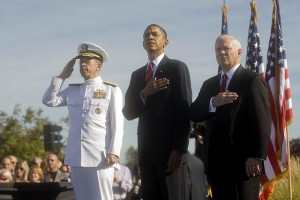
It has been 10 years since Sept. 11. Americans and countless others across the globe have spent those years dealing with the memories and repercussions of the attack.
Rather than encouraging Americans to look on the past with a fresh perspective, government officials are proposing ways of framing reactions and memories.
On Aug. 30 the White House released two documents (one for domestic use and one for those abroad) outlining how government officials should commemorate the 10th anniversary of 9/11.
I am glad the government put such thought into honoring the victims of 9/11 and is encouraging Americans to volunteer and reach out to other nations who have been hurt by terrorist attacks.
I’m proud of America for not only reflecting on the past but also looking towards the future and encouraging community and global fellowship.
The anniversary of 9/11 should be a time to remember those who were lost on that day. It should provide a chance for us to consider our individual actions towards our neighbors as well as the actions taken by our country before and after the attacks.
It should be a time for silent reflection but also for conversation, community, discussion and enlightenment.
However, these reflections should not be impeded by the way our government wants to frame our thoughts on the attacks.
Though the government cannot force its citizens to present a certain story of 9/11, the fact that the government would suggest a perspective places limits on our freedom to think independently.
By planning out how Americans should perceive Sept. 11, the government is taking away the people’s right to think about and deal with the attacks on their own terms.
The 9/11 attacks and their subsequent anniversaries are not events the government should be able or attempt to manipulate. Creating and distributing the 9/11 Anniversary Planning – as the domestic guidelines are termed – makes the whole event seem scripted, detached and regulated.
The document given to embassies and consulates abroad declares its intent to “present a positive, forward-looking narrative.”
By using the words “present” and “narrative,” the White House appears to be shaping how we felt 10 years ago and in the years since in order to present a specific front to the rest of the world.
The government is saying there is a correct way to remember and piece together the emotions surrounding 9/11. Americans came together and relied upon one another in the aftermath of the attacks, but each individual lived through unique experiences and emotions. The American people should be able to reflect on the events of 9/11 and their impact and then come to their own conclusions rather than be told how to think about those events.
A stronger narrative could emerge if the government did not promote a certain way of thinking about and remembering the Sept. 11 attacks.





Charles van Heck • Sep 3, 2011 at 5:01 pm
Ms. Schatz, you have articulated what many of us think about the Administrations memos. I particularly appreciate your emphasis on a “stronger narrative.” Our remembrance doesn’t have to result in more hate or suspicion of Muslims or others. Yes, we need to be on our guard, but in a manner that allows us to weaken the support for extremism in our communities and strengthen our democratic principles while encouraging service, as the White House’s domestic memo states. Thank you for your thoughtful editorial. Very truly yours, Charles van Heck
Steven Jones • Sep 2, 2011 at 7:59 pm
This was a really interesting opinion article, but I’m a bit hung up on your line ‘…(one for domestic use and one for those abroad) outlining how government
officials should commemorate the 10th anniversary of 9/11.’
It isn’t wrong to argue Americans should commemorate the anniversary as they wish, but this communication seems to be only advising U.S. Government Officials and Embassy staffs, not the general public.
Government officials (domestic & abroad), whether we like it or not, are under a microscope of scrutiny that is both wide and deep, and is exceptionally different than how the average U.S. citizen is seen in celebration/speech.
But they are also not being fully restricted of their rights either as the NYTimes has reported: “Officials interviewed at several federal departments said they would
consult the White House guidelines, but had been given broad leeway to
hold commemorative events at their agencies.”
The separate cable for Embassies is equally important, as these office represent the entire country, and are often in countries that do not always have favorable opinions about the U.S. government.
It appears they are not trying to promote a national narrative for all of us to follow, but simply Federal guidelines for federal offices here and abroad. This wasn’t sent out to Governors, U.S. Senators/Reps, or to the general public.
But the document does state one thing for the broader American public on the anniversary (also from the NYTimes): “The domestic guidelines also ask something of Americans that has been
lacking in Washington: ‘We will also draw on the spirit of unity that
prevailed in the immediate aftermath of the attacks’.”
That’s what I remember when I was in 5th grade 10 years ago, and it is something I hope one day will truly return to the national tone regarding out government.